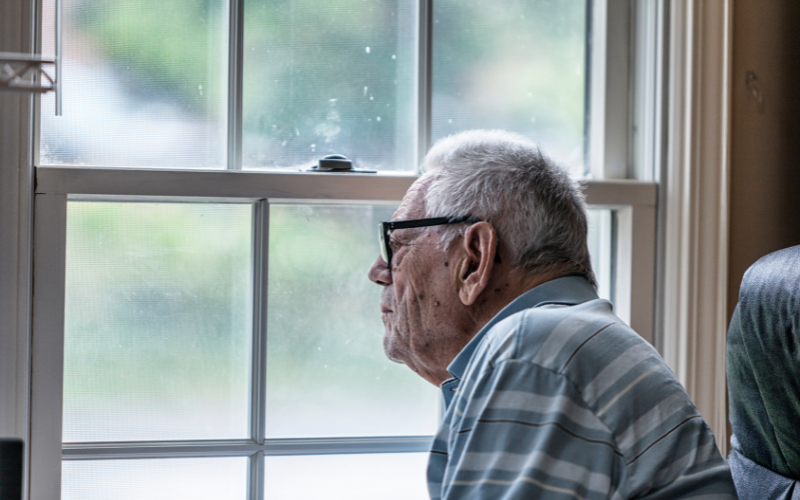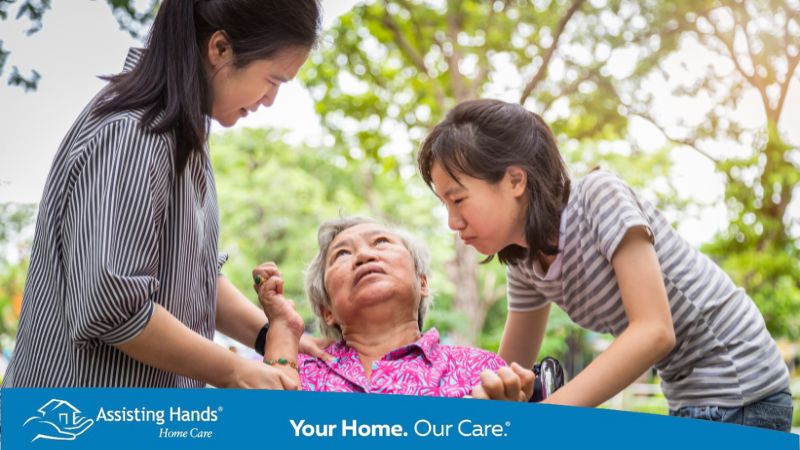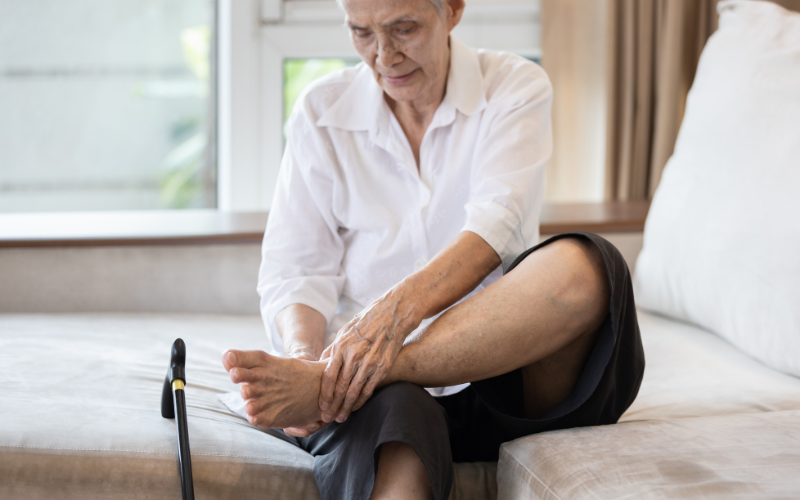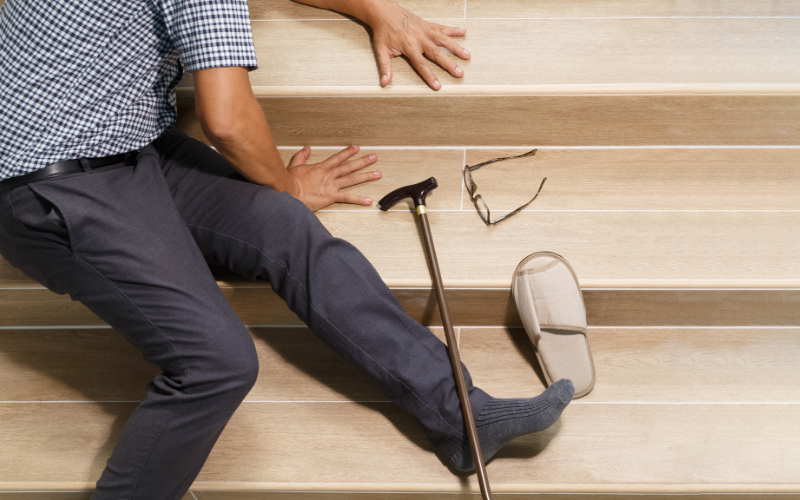
Autumn and winter’s early evening hours of twilight and sunset worsen sundown syndrome. Older adults diagnosed with dementia become increasingly confused and agitated. When providing care, it’s important for caregivers to factor in the increasing darkness during these cooler seasons.
What is sundown syndrome?
Sundown syndrome, aka sundowning, manifests in the late afternoon, evening, and night. The elderly experience a range of neuropsychiatric symptoms during these periods, such as agitation, confusion, anxiety, or aggressiveness. Sundowning is highly prevalent among older adults diagnosed with dementia.
This phenomenon is believed to occur because of an impaired circadian rhythm, environmental and social factors as well as impaired cognition. A decreased production of melatonin is also associated with sundown syndrome. The senior begins to show disruptive behaviors toward the end of the day.
What are symptoms of sundowning?
A senior who is affected by sundowning experiences a range of symptoms. They may pace the floors, wander or yell. Visual and auditory hallucinations in the late afternoon and evening disturb them. Other symptoms include mood swings, suspiciousness, and an uncharacteristically demanding attitude.
As daylight decreases, seniors with sundown syndrome may become confused and disoriented. Delirium can occur close to darkness. Agitated behaviors like these that appear as soon as darkness descends can make it more difficult for caregivers to manage the care of the elderly person.
The severity of sundowning symptoms increases in proportion to the senior’s level of cognitive impairment. It is also a common disturbance among older adults living in care facilities. However, sundowning occurs in 66 percent of elderly individuals living at home.
How do the fall and winter months worsen sundowning?
Sundowning is closely linked with the seasons. An increase in the number of cases rises during the fall and winter months, when the amount and duration of sunlight decrease. Especially in seniors with Alzheimer’s disease, they are already inadequately exposed to light during the daytime hours.
In the elderly suffering from dementia, changes in perception can occur as day turns into twilight. The low lighting and the number of increasing shadows associated with these parts of the day are thought to aggravate late-day confusion and symptoms of sundowning.
During the months of fall and winter, the days grow shorter and the darkness arrives earlier. For seniors with sundown syndrome, these seasonal aspects (shorter days and lack of sun) are triggers. Winter also puts stress on the sleep-wake cycle of older adults.
How do caregivers minimize the symptoms of sundowning?
Although the winter months can worsen sundown syndrome, caregivers can take steps to lesson the severity of the symptoms. The change from day to night causes a disruption to a senior’s circadian rhythm. Minimize the symptoms caused by the earlier nights by using lights.
1. Turn on lights
Caregivers might try switching on the lights in the home to lessen the impact of shadows and darkness. Turn on these lights before the sun begins to set. Practice bright light therapy to help decrease symptoms and their severity in elderly dementia patients.
Exposure to daytime sunlight, especially in the winter months, can improve the senior’s levels of serotonin and endorphins and better regulate their circadian rhythm. As a result, they sleep better and longer—both of which decrease their agitation even during the evenings.
2. Set a schedule
Implement a routine, especially around the evening hours. Sleep, mealtimes, and activities should follow a predictable schedule. Caregivers who notice that symptoms of sundowning appear in the early evenings should plan to serve their aging loved one dinner well before then.
3. Encourage rest
Similarly, establish a period of rest. Try turning on soothing white noise machines and applying relaxing essential oils. Or set a specific time for reading in bed. By managing the older adult’s energy levels in these ways, caregivers can prevent some symptoms of sundowning.
4. Schedule daytime activities
Schedule as many activities during the day as possible to increase the senior’s exposure to sunlight. Social activities and extra sunlight also minimize the chances of developing seasonal affective disorder (SAD); symptoms of sundown syndrome are more severe in people with SAD.
5. Fulfill unmet needs
Meet all needs, especially around the evenings. Provide medication reminders, encourage rest and relaxation, and ensure the senior remains well-fed and hydrated. If anxiety arises, reassure the senior. In winter, check the room temperature and offer extra blankets to promote warmth and comfort.
Sundown syndrome cannot be cured, but caregivers can make the abovementioned lifestyle changes to minimize the severity of symptoms. Living with dementia is difficult and sundowning can exacerbate the challenges significantly. Caregivers are urged to understand the phenomenon and try to spot early signs.

Caregivers who manage symptoms of sundowning improve their aging loved one’s quality of life. When family caregivers are too busy juggling their own households, the professionals at Assisting Hands Home Care can step in and provide quality dementia care in the comfort of the senior’s home.
Our memory caregivers are trained to identify symptoms of dementia, such as wandering, agitation, and short-term memory loss. Caregivers also recognize symptoms of sundowning in elderly care recipients. We compassionately manage their symptoms to promote overall physical, emotional, and social health.
When wandering occurs, we accompany the senior to ensure they do not exit the home. Incontinence issues are discreetly handled so that care recipients remain clean and comfortable. We provide timely medication reminders so that seniors remain in medication compliance.
Additional care responsibilities include grocery shopping, healthy meal preparation, light housekeeping, and transportation to local destinations, like the doctor’s office or senior center. We perform fall-risk assessments and clear clutter to prevent trips and falls. Our companionship deters loneliness and social isolation.
If your aging loved one suffers from dementia and bouts of sundowning during the fall and winter months, Assisting Hands Home Care will be invaluable. We serve seniors in Burr Ridge, IL | Lyons, IL | Indian Head Park, IL | McCook, IL | Hodgkins, IL | Countryside, IL | Willow Springs, IL | Palisades, IL | La Grange Highlands, IL | Clarendon Hills, IL | Brookfield, IL | Western Springs, IL | Hinsdale, IL | Darien, IL | La Grange, IL | Downers Grove, IL | Oak Brook, IL | Willowbrook, IL, during every season of the year. Call us at (630) 407-1932 to schedule a free in-home consult and learn about our quality memory care.















